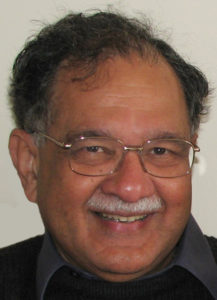Do ”˜Black Lives Matter’ to the Indian-Australians Down Under

By Neville Roach
In The American Bazaar on 20-07-20 under the title “Black Lives Matter: Are Indian Americans guilty of silence?” Revathi Siva Kumar asks, “Have the people from the land of Mahatma Gandhi done enough for the oppressed African Americans? How many of them stood in solidarity with the protesters against police brutality and racism?”

Black Lives Matter Protest held in Sydney
Questions on ”˜Brown Silence’ have also been raised in the UK and Canada. The context is that Indians in these countries have been hailed as the ”˜model minority’. Being on that pedestal is seen to carry responsibility of setting an example and being at the forefront in support of the Black Lives Matter (BLM) cause. Exacerbating the criticism is the well-known inherent negative bias of us Indians towards dark-skinned people, as the massive sales of whitening agents like ”˜Fair and Lovely’ in India and the preference for light-skinned people in Indian matrimonial columns, testify.
Interestingly, Indian Australians haven’t been similarly challenged. If we were, we would find it very difficult to argue that our community has actively supported BLM. We certainly haven’t been sufficiently engaged for the mainstream media to have noticed. We could argue that ours is a relatively new community, with most still settling in and entirely focused on building a new life for themselves and their families. While this might excuse those who arrived this century, what about those, like me, who came here from the sixties, when modern non-white migration began, to 2000? After all, our cohort is well established and our success in a wide range of ’mainstream’ occupations ”“ the professions, academia, technology, senior roles in the private and public sectors and business ownership ”“ has been disproportionately high. Why have we not been more vocal?
The question could also be asked of leaders of the numerous India-focused cultural, community or other domain-specific associations, several of which are substantial and influential. They too don’t seem to have said much, certainly not in a sustained manner. Given the intensity with which BLM has galvanised the nation, their apparent silence risks them, their members and the wider Indian community being seen as disinterested bystanders, unwilling to become involved in an issue of such national importance.
Apart from reputational damage, silence also wastes an unprecedented opportunity of becoming and feeling part of the wider community as equals who belong. Engagement in this seminal movement would have enhanced our national reputation as migrants who accept shared responsibility for all the wrongs done to Indigenous Australians. Working hand-in-hand with our fellow Australians, Indigenous and non-Indigenous, would also have fostered a feeling of kinship with them. Such mutually positive sentiments could only have gained us more acceptance, raised our standing and accelerated our further progress.
Of course, the opportunity has not been lost as the movement is still in its infancy. Lifting Black Lives to anywhere near non-Indigenous levels will take years, probably decades. However, many reforms can be initiated and/or accelerated immediately ”“ eliminating Deaths in Custody, reducing incarceration, protecting Sacred Sites from destruction more effectively, commencing Treaty negotiations and fast-tracking the process towards Constitutional Recognition including a First Nations Voice ”“ to name just a few. All these are achievable in this term of Government. The Indian community, with its sizeable numbers in influential positions, can still make a meaningful contribution to such nation-changing reforms. But the effort must start now!
The onus is on opinion leaders in our community to seize the moment, making it clear that Black Lives do Matter to us and that we are committed to making Black Lives Better. We must speak out clearly, loudly, and repeatedly so that we not only energise our own community, but also influence Australians generally. Our leaders will first need to overcome possible community excuses for non-involvement, including:
- Primary responsibility rests with the British invaders and their descendants. Black disadvantage was already entrenched before new communities, like those from India, arrived.
- As newcomers we must focus on betterment of ourselves and our families before becoming involved in social and political issues.
- Indigenous Australians must address their own problems ”“ excessive alcohol consumption, choosing to live in remote locations, allowing their homes to fall into disrepair.
- They should focus on their studies and jobs like we Indian migrants do.
Many of our leaders may struggle responding to these views. Some might even harbour similar opinions. They may not fully appreciate the dehumanising and debilitating impact of ”˜terra nullius’, enslavement and genocide since 1788. Most would have little knowledge of Aboriginal care for these lands and waters, their practices of bushfire control, their growing of crops, their numerous other skills that helped them survive and thrive on this harsh continent for at least 65,000 years and the reality that they remain Sovereign Nations and, until the collective migrant community signs a treaty with them, our occupation and exploitation of Australia lacks legal and moral justification.
The onus is now on us leaders to seize the moment and unequivocally declare our commitment to making Black Lives Better. India-focused cultural, community or other domain-specific associations, in particular, must make public statements of support and initiate active programs for their members. Focused interest groups and events will demonstrate genuine commitment and positively influence participants, their families, friends and associates. Indian ethnic media and Indian language programs on SBS and community stations can also play a significant role keeping the issue alive within the community, with editorials, interviews and opinion pieces and fostering active engagement through on-line social platforms.
Collectively, we could set an example for other new communities from Asia and elsewhere to emulate. Let us become a ”˜model minority’, not just in terms of academic and economic success, but also as a sharing, caring and leadership group, actively engaged in helping bring about a giant leap forward for the Sovereign Nations of Australia and the entire migrant community. We must do this because we too are Australians!
Courtesy: Above article appeared first in the website:
Short URL: https://indiandownunder.com.au/?p=15395
